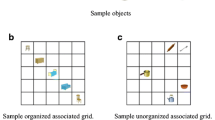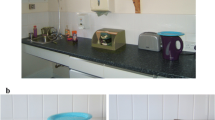Abstract
In this study, we investigated where the sex differences of object-location binding memory performance were influenced by the cognitive load. We used the fractal objects version of the ‘What was where?’ task to measure object memory, location memory and objection-location binding memory. Cognitive load was controlled by task difficulty presented two sessions: one session randomly displayed three or four fractal objects (Session 34) and the other session four or five objects (Session 45). The results showed that females outperformed males on object-location binding memory. Interestingly, even when the four object trials were compared between Session 34 and Session 45, in which we believed that the level of difficulty was similar while cognitive load varied, the swap error of males was significantly increased in Session 45 compared to females. In conclusion, there may be sex differences in object-location binding memory and the males could be more sensitive about the cognitive load than females.



Similar content being viewed by others
References
Astur RS, Ortiz ML, Sutherland RJ. A characterization of performance by men and women in a virtual Morris water task: a large and reliable sex difference. Behav Brain Res. 1998;93(1):185–90.
Moffat SD, Hampson E, Hatzipantelis M. Navigation in a “virtual” maze: sex differences and correlation with psychometric measures of spatial ability in humans. Evol Hum Behav. 1998;19(2):73–87.
Driscoll I, Hamilton DA, Yeo RA, Brooks WM, Sutherland RJ. Virtual navigation in humans: the impact of age, sex, and hormones on place learning. Horm Behav. 2005;47(3):326–35.
Rahman Q, Koerting J. Sexual orientation-related differences in allocentric spatial memory tasks. Hippocampus. 2008;18(1):55–63.
Voyer D, Postma A, Brake B, Imperato-McGinley J. Gender differences in object location memory: a meta-analysis. Psychon Bull Rev. 2007;14(1):23–38.
Rahman Q, Wilson GD, Abrahams S. Sexual orientation related differences in spatial memory. J Int Neuropsychol Soc. 2003;9(03):376–83.
Hassan B, Rahman Q. Selective sexual orientation-related differences in object location memory. Behav Neurosci. 2007;121(3):625.
Silverman I, Choi J, Peters M. The hunter-gatherer theory of sex differences in spatial abilities: data from 40 countries. Arch Sex Behav. 2007;36(2):261–8.
Spiers MV, Sakamoto M, Elliott RJ, Baumann S. Sex differences in spatial object-location memory in a virtual grocery store. CyberPsychol Behav. 2008;11(4):471–3.
Dabbs JM, Chang E-L, Strong RA, Milun R. Spatial ability, navigation strategy, and geographic knowledge among men and women. Evol Hum Behav. 1998;19(2):89–98.
Epting LK, Overman WH. Sex-sensitive tasks in men and women: a search for performance fluctuations across the menstrual cycle. Behav Neurosci. 1998;112(6):1304.
Janzen G, Van Turennout M. Selective neural representation of objects relevant for navigation. Nat Neurosci. 2004;7(6):673–7.
Postma A, Jager G, Kessels RP, Koppeschaar HP, van Honk J. Sex differences for selective forms of spatial memory. Brain Cogn. 2004;54(1):24–34.
Jones CM, Healy SD. Differences in cue use and spatial memory in men and women. Proc R Soc Lond B Biol Sci. 2006;273(1598):2241–7.
Kessels RP, Nys GM, Brands AM, van den Berg E, Van Zandvoort MJ. The modified Location Learning Test: norms for the assessment of spatial memory function in neuropsychological patients. Arch clin neuropsychol. 2006;21(8):841–6.
Postma A, Izendoorn R, De Haan EH. Sex differences in object location memory. Brain Cogn. 1998;36(3):334–45.
Rahman Q, Bakare M, Serinsu C. No sex differences in spatial location memory for abstract designs. Brain Cogn. 2011;76(1):15–9.
Pertzov Y, Dong MY, Peich M-C, Husain M. Forgetting what was where: The fragility of object-location binding. PLoS One. 2012;7(10):e48214.
Pertzov Y, Miller TD, Gorgoraptis N, Caine D, Schott JM, Butler C, et al. Binding deficits in memory following medial temporal lobe damage in patients with voltage-gated potassium channel complex antibody-associated limbic encephalitis. Brain. 2013;136(Pt 8):2474–85. doi:10.1093/brain/awt129.
Gallagher P, Neave N, Hamilton C, Gray JM. Sex differences in object location memory: some further methodological considerations. Learn Individ Differ. 2006;16(4):277–90.
Postma A, De Haan EH. What was where? memory for object locations. Q J Exp Psychol Sect A. 1996;49(1):178–99.
Eals M, Silverman I. The hunter-gatherer theory of spatial sex differences: proximate factors mediating the female advantage in recall of object arrays. Ethol Sociobiol. 1994;15(2):95–105.
Lewin C, Wolgers G, Herlitz A. Sex differences favoring women in verbal but not in visuospatial episodic memory. Neuropsychology. 2001;15(2):165–73.
Acknowledgements
This work was supported by the National Research Foundation of Korea (NRF) grant funded by the Korea government (NRF-2015R1D1A1A01059743).
Author information
Authors and Affiliations
Corresponding author
Rights and permissions
About this article
Cite this article
Park, J., Shin, G.I., Park, Y.M. et al. Sex differences of cognitive load effects on object-location binding memory. Biomed. Eng. Lett. 7, 305–309 (2017). https://doi.org/10.1007/s13534-017-0038-z
Received:
Revised:
Accepted:
Published:
Issue Date:
DOI: https://doi.org/10.1007/s13534-017-0038-z




